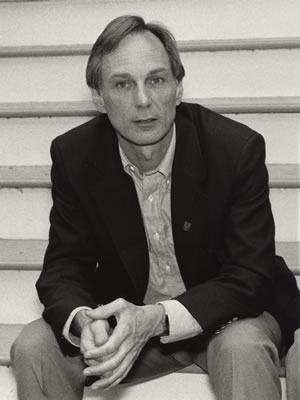Ken Paff
In 1991, the Teamsters Union’s rank and file voted to throw out the entrenched, corrupt old-guard successors to Jimmy Hoffa, Sr. and elect a reform president. Five years later, Jimmy Hoffa’s son was narrowly defeated for election as president of the Teamsters. No sooner had the reform victory over Hoffa been declared, than the election was set aside, and the reform coalition’s successful candidate disqualified by a federal overseer for secretly taking improper campaign contributions. In 1998, once again, a new Teamsters’ presidential election pits the Jimmy Hoffa old guard against a growing cadre of reformers fighting to inform a large and diverse constituency.
Throughout these important events in the history of the International Brotherhood of Teamsters, Ken Paff has stood above the mud-slinging, while carefully building and rebuilding the coalitions necessary to promote reform. In his 25 years as a union reform activist, Ken has been unwavering in his commitment to empower workers, wipe out corruption, and restore union democracy.
Ken grew up in Beaver Falls, Pennsylvania, one of seven children, the son of a union steelworker and a housewife. “If it hadn’t been for unions my family would have been dirt poor,” he says. At age ten, he moved with his mother to Santa Ana, California, to live with his brother. As a student at the University of California at Berkeley, he was active in the civil rights and peace movements, acting on his strong childhood awareness that “the people on the bottom didn’t always get what was coming to them.”
After working briefly as a public school teacher, Ken became a truck driver and a member of the Teamsters. “I wanted to build a movement of working people for justice,” he says. “Politics in this country is not an involving thing, I wanted [the Teamster reform movement] to be the opposite.” In 1976, Ken helped found Teamsters for a Democratic Union, and in 1980 he was able to unite it with another reform group, the Professional Drivers Council. The combined group, using the name Teamsters for a Democratic Union (TDU), dedicated itself to union democratization and reform. Operating on a shoe-string budget and in the face of severe opposition and the threat of violence from the union’s old guard, Ken became a national organizer of TDU, a position he still holds today.
Under his guidance, TDU has become a central force in organizing grassroots union reform in the Teamsters and an inspiration to other unions. In a highly charged environment in which reform movements have themselves been exposed as opportunistic variations on the corrupt old guard, TDU continues, unsullied, to fight for change. Under Ken’s leadership, TDU has won court victories for fair union elections, protected members’ pensions against the embezzlement of corrupt leaders, and made advances for drivers’ safety. “Half the battle is convincing people it’s not up to lawyers and politicians—it’s up to you,” he says of TDU’s success.
The November, 1997, disqualification of Teamsters President-elect Ron Carey, the reform candidate who beat Jimmy Hoffa, Jr. in 1996, was a severe blow to the reform movement. But Ken rallied to launch two new projects to meet the Teamsters’ current needs. The first will build rank and file power at the ground level of the union and provide training and support to elected union officials to help them nurture union democracy. The second project seeks to use the new election to expand the reform campaign under new candidates with a broader agenda.
“One of the central impediments to getting people involved is fear,” Ken says. “Members of the TDU are frequently intimidated in their jobs. In this country, we enjoy great rights like free speech—you can call the President of the United States any name you want—but if you try to exercise those rights at work, it’s another story.” Ken takes heart that TDU has been able to organize so many people. “The nineties may be a time of greed in which it seems like everyone’s out for number one, but if people see there’s an opportunity to get involved, they do.”
“When our organization gets together it feels like a family,” Ken says. He spends much time traveling to union locals across the country, trying to convince—with varying degrees of success—reform leaders to adopt common priorities and focus on rooting out the elaborate tentacles of corruption that have plagued the union. “When we say solidarity, it’s not just something out of a book.” His steady efforts to right wrongs within the union and forge a more effective, more powerful workers’ alliance are bringing back the true and noble sense of solidarity that unions were created to foster.
 Photo by Dorothea von Haeften
Photo by Dorothea von Haeften